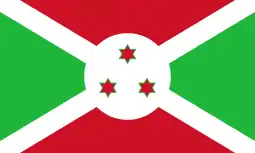Mass media in Burundi
Mass media in Burundi is controlled by the government.
| Part of a series on the |
| Culture of Burundi |
|---|
 |
| History |
| People |
| Languages |
| Cuisine |
| Religion |
| Art |
| Sport |
|
Telephone
In 2003 in Burundi, there were an estimated three mainline telephones for every 1,000 people; about 4,700 people were on a waiting list for telephone service installation. The same year, there were approximately nine mobile phones in use for every 1,000 people.
Radio
- See also: List of radio stations in Africa: Burundi and List of radio stations in Burundi
In 2001, there were four FM radio stations, two of which were owned by the government, including the Voice of the Revolution, broadcasting in Rundi, Swahili, French, and English. There were eight privately owned radio stations in 2004, including Radio Isanganiro, Bonesha FM, and African Public Radio (RPA); all of these are broadcast in French, Rundi, and Swahili. Some stations receive funding from international donors. Transmissions can be received from British Broadcasting and Radio France Internationale.
Television
Television in Burundi was introduced in 1984, and began colour transmission in 1985. As of 2004 there was still only one television service, the Télévision Nationale du Burundi. This was owned by the government. In 2003, there were an estimated 220 radios and 35 television sets for every 1,000 people.
Internet
Burundi has launched a $25 million investment project in a fibre-optic cable network to widen access to broadband Internet and cut costs.[2]
The main Internet publications in Burundi are
Ikiriho Groupe Iwacu RegionWeek Igihe burundisports
Print
The government issues a French-language daily, Le Renouveau du Burundi, with a circulation of 20,000 in 2002, and several periodicals, including a weekly newspaper, Ubumwe, published in Kirundi, with a 1999 circulation of 20,000, and Burundi Chrétien. There were five private weekly papers as of 2004 and eight private Internet and fax news sheets.
- Arc-en-Ciel
- Burundi Chrétien
- Burundi Tribune
- Le Renouveau du Burundi
- Ubumwe
Freedom of speech
Though there are no official restrictions upon expression or the press, the regime owns the only daily newspaper and two of the major radio stations, and information is said to be slanted toward pro-government opinions.
See also
- Burundian literature
- arte
- Internet censorship and surveillance in Burundi
- BeTV (Burundi)
Bibliography
- "Burundi: Directory: Broadcasting and Communications". Africa South of the Sahara 2004. Regional Surveys of the World. Europa Publications. 2004. p. 158. ISBN 1857431839.
- "Burundi", Freedom of the Press, USA: Freedom House, 2016, OCLC 57509361
- "Radio silence: Burundi's media targeted in ongoing political crisis", Global Voices, 17 February 2016 – via The Guardian
References
- "RFI - Création de Télé Renaissance". 1.rfi.fr. Retrieved 3 January 2019.
- "Burundi invests $25 mln in high-speed Internet network". Reuters.com. 21 January 2014. Retrieved 3 January 2019.
External links
- "Burundi". Electronic Newspapers of Africa. Virtual Libraries: African Studies. New York, USA: Columbia University Libraries.
- Karen Fung, African Studies Association (ed.). "News (by country): Burundi". Africa South of the Sahara. USA – via Stanford University.
Annotated directory